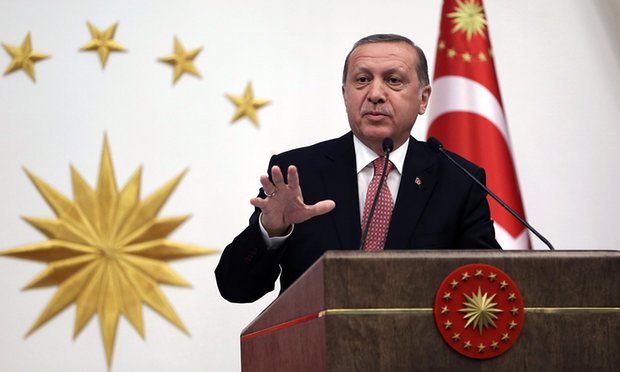
by Robert Whitcomb | Jun 10, 2016 | AI World Society Summit
(June 13th, 2016) Tensions between NATO and Russia, already high, have gone a bit higher with the vaguely threatening remarks by the Russian Foreign Ministry that Russian leader Vladimir Putin would respond to a U.S. Navy destroyer’s entry into the Black Sea with unspecified measures, Reuters and other news media report. Turkey, Romania and Bulgaria, all of which border on the Black Sea, are members of NATO.

Russian state media reported that the USS Porter, a U.S. naval destroyer, entered the Black Sea a few days ago, a move that state media said angered Moscow because the warship was recently fitted with a new missile system.
U.S. Navy officials told reporters on June 8 that the U.S. would also have two aircraft carriers in the Mediterranean this month ahead of a July NATO summit in Warsaw as Washington continues to seek to address Russia’s intensifying military activities in eastern Europe and Syria.
For more details, hit this link.

by Robert Whitcomb | Jun 10, 2016 | AI World Society Summit
(June 13th, 2016) A fascinating article in The Harvard Gazette tells how the Chinese government “fakes 448 million social-media posts a year in a strategy that seeks to create the appearance of ‘viral’ outbursts of Web activity, according to a new study by Harvard data scientists.’’

Gary King is the Albert J. Weatherhead III University Professor at Harvard University, based in the Department of Government. He is pictured in the CGIS Knafel Building. Stephanie Mitchell/Harvard Staff Photographer
“The posts appear under the names of apparently ordinary people, and aim to distract from topics related to actual or potential collective action, said Gary King, the Albert J. Weatherhead III {Harvard} University Professor, who carried out the research with two of his former graduate students….’’
“The research shows that assumptions about the Chinese government’s tactics in this area are wrong, King said. The prevailing belief among journalists, academics, and activists, he said, has been that the government maintains an aggressive social media strategy that actively rebuts anti-government posts and tries to cast opponents, whether domestic or foreign, institutional or individual, in a negative light.
“In fact, such posts make up a tiny minority, the researchers found. Most qualify as ‘cheerleading’: praise for the government and items on revolutionary history, national holidays, and other patriotic themes. In short, King said, the government is trying to distract people, and defuse tension over fraught issues.’’
To read the whole article, hit this link.

by Robert Whitcomb | Jun 9, 2016 | AI World Society Summit
(June 13th, 2016) Two Israeli citizens pleaded not guilty on June 9 to charges of running a massive computer hacking and fraud scheme that generated hundreds of millions of dollars of illegal profit, Reuters reported.
Gery Shalon and Ziv Orenstein entered their pleas in Manhattan federal court, after having been extradited from Israel.

The indictment charges them with alleged crimes that targeted 12 companies, including nine financial-services companies, including JPMorgan Chase, and such media as The Wall Street Journal.
The indictment included counts of computer hacking, securities and wire fraud, identity theft, illegal Internet gambling and conspiring to commit money laundering.
Prosecutors said the alleged scheme started in 2007 and compromised more than 100 million persons’ personal information.
For more details, hit this link.

by Robert Whitcomb | Jun 10, 2016 | Initiative
(June 13th, 2016) Military forces of the Libyan government claimed that they have reached the center of the coastal city of Sirte, the Islamic State’s key stronghold in Libya. That could mean that the fanatical group may have lost all the land it controlled in the country, a failed state wracked by civil war.

The advance of the anti-ISIS force surprised many given that U.S. intelligence officials had suggested only recently that ISIS had 6,000 fighters in Sirte and threatened neighboring Tunisia.
For more details, hit this link.

by Robert Whitcomb | Jun 8, 2016 | AI World Society Summit
(June 13th, 2016) In another case of scary close encounters caused by China’s increasingly aggressive posture in the East China and South China Seas, a Chinese fighter jet flew very close to a U.S. Air Force reconnaissance plane on June 7 in the East China Sea, where ownership of some islands is disputed between Japan, a close U.S. ally, and China.

The United States Pacific Command said that one of two Chinese jets involved in an intercept operation on Tuesday had “an unsafe excessive rate of closure on the RC-135 aircraft.”
But it also said that “This seems to be a case of improper airmanship, as no other provocative or unsafe maneuvers occurred.’’
As tensions worsen between China, the U.S. and other Asia-Pacific nations the number of potentially dangerous close encounters.
Just last month, for example, two Chinese fighter jets flew very close to an American military patrol aircraft off the island of Hainan, China’s southernmost province.
The U.S. said that broke an agreement, signed by China and the U.S. last year, meant to ensure safe operations in the air. Hit this link for more details.

by Robert Whitcomb | Jun 8, 2016 | AI World Society Summit
(June 13th, 2016) Bloomberg Video: Why China’s economy will be so hard to fix. Hit this link.


by Robert Whitcomb | Jun 8, 2016 | AI World Society Summit
(June 13th, 2016) The French government has launched an app to alert users to terror attacks. The new service comes as the Euro 2016 soccer championship was about to get underway.

The Interior Ministry app, called SAIP, flashes a warning on users’ mobile phones if there is an attack close to their locations or suspicion of an imminent strike. Users can also request alerts for up to eight areas, including individual districts in Paris.
Hit this link for more details.

by Robert Whitcomb | Jun 8, 2016 | AI World Society Summit
Turkey’s increasingly dictatorial president, Recep Erdogan, has destroyed his nation’s chances of joining the European Union by 2020, as some had hoped, for pushing through a new law aimed a destroying parliamentary opposition to Mr. Erdoğan’s ruling neo-Islamist Justice and Development party (AKP) by encouraging politically inspired, criminal prosecutions of anti-government legislators.
The E.U.’s rules demand that all applicant states must adhere to democratic governance and uphold such other basic principles as the rule of law, human rights, including freedom of speech, and protection of minorities. President Erdogan now bitterly calls the E.U. “a Christian club.’’
For more details, hit this link.

by Robert Whitcomb | Jun 8, 2016 | AI World Society Summit
(June 13th, 2016) A poll of Australians suggest that most believe that China has become the most influential nation in the Asia-Pacific region and that more want stronger ties with the rising superpower than with the U.S., The Guardian reported.

Enthusiasm for a strong U.S. role in the Asia-Pacific was also significantly lower in Australia than in South Korea, Indonesia, Japan and even China in some cases, according to the research released on Wednesday by the University of Sydney’s U.S .Studies Centre and regional partners.
The Guardian reported that “More Australians (70%) were likely to see Beijing and Washington as ‘competitors’ than even the Chinese citizens surveyed (50%), though the poll also found a significant lack of regional awareness among Australian respondents, 42% of whom were not aware that Japan was a U.S. ally.”
Only the South Koreans and the Japanese felt generally positive about the U.S. role in the region.
James Brown, a research director at the U.S. Studies Center, told The Guardian that the results suggested Australians “remain seized by the narrative that U.S. power is declining in the region” and had a “a benevolent view” of the rivalry between China and the U.S. and “might not automatically identify with Japanese concerns over China” – including disputes over islands in the South China Sea.
For more details, hit this link.









